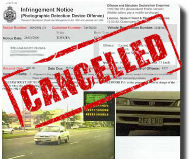9/27/2013
Speed Camera Fines Challenged WorldwideOfficials in Austria, Australia and Italy face the prospect of refunding thousands of inappropriate speed camera fines.

In Parma, Italy, the group Nuovi Consumatori insists the city never obtained the proper authorization for its speed cameras and that 40,000 tickets worth 9 million euros (US $12 million) issued between January 16 and July 31 of this year should be refunded. The group has asked the public prosecutor to charge Mayor Federico Pizzarotti with a seven counts of fraud and to confiscate the cameras, according to Blitz Quotidiano. This is no idle threat, as a number of officials have been arrested in Italy over speed camera fraud since 2006.
The wheels of justice turn slowly in Italy. This week, prosecutors in Milan dropped bid rigging charges leveled seven years ago against the police chief in the town of Lendinara. The chief was accused of setting up a phony competition between non-existent companies to win the photo enforcement contract. The trial for the accused photo radar firm, Ci.Ti.Esse Srl, begins March 18, 2014.
In Austria, officials were forced to refund 4000 bogus tickets worth 230,000 euros (US $310,000) that were issued on the A12 highway west of Innsbruck. Between July 2012 and May 2013, the camera issued tickets to motorists during the imposition of a 100km/h (62 MPH) "Air and Noise" environmental speed limit created by the Green Party. Because of faulty sensors, however, incorrect traffic count data was used to lower the speed limit far too often. Kleine Zeitung reported that officials agreed to refund the fines collected "to regain the trust of the citizens."
In Queensland, Australia, two courts have ruled the TruCam handheld lidar speed camera gun does not produce valid evidence of speeding. The Courier-Mail newspaper reported Tuesday that the Brisbane District Court tossed speed camera tickets because the Trucam device did not imprint the estimate of the speed and the date on the image allegedly showing the infraction. In another case, a motorist proved that the date and speed details were added to the photo later in the ticketing process, not at the time of the alleged offense.
"For the prosecution to rely on the contents of the data block to prove the speed of the vehicle then the data block must be made by the photographic detection device," Magistrate Sheryl Cornack ruled. "Clearly the photographic detection device did not make any writing on that image as it is not shown in the notice. Clearly the writing has been added at a later time."
The decisions are under appeal, leaving open the possibility that thousands of speed camera fines issued by the TruCam devices could be challenged.


